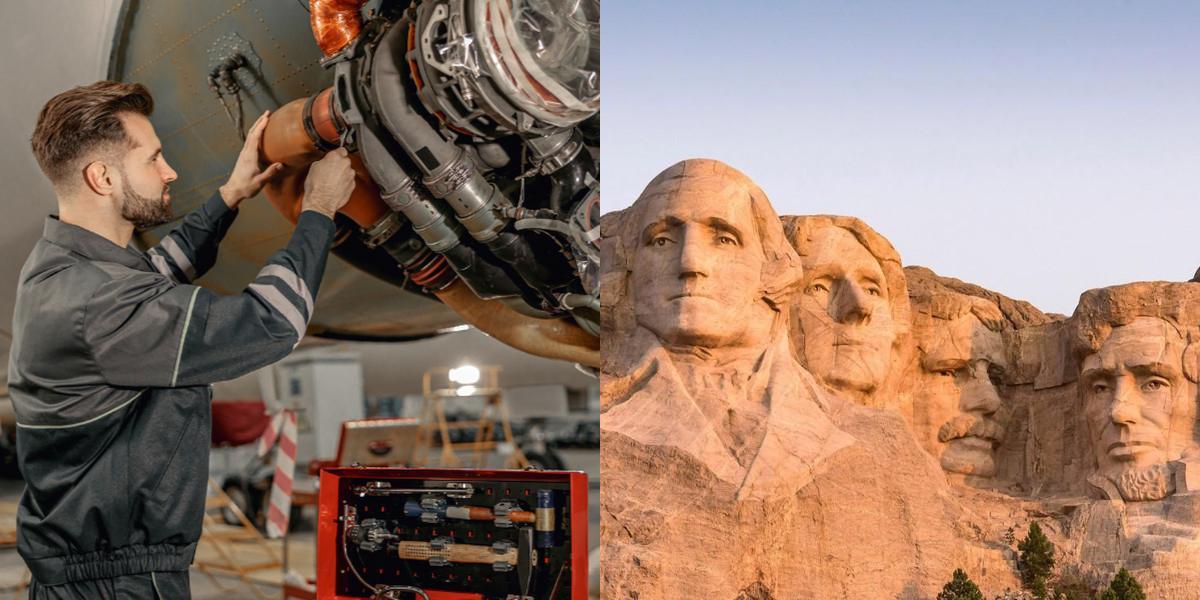How to Become an Aviation Mechanic in South Dakota

Want personalized recommendations?
Let's match you to the right program

What is an Aviation Mechanic?
An Aviation Mechanic, also known as an Aircraft Mechanic or Aircraft Maintenance Technician, is a skilled professional responsible for inspecting, repairing, and maintaining aircraft. They ensure that airplanes, helicopters, and other aircraft are in optimal working condition to guarantee safe and efficient flights.
The responsibilities of an Aviation Mechanic include:
- Conducting routine inspections and maintenance checks on aircraft systems, such as engines, hydraulics, and electronics.
- Repairing or replacing defective parts and components.
- Troubleshooting and diagnosing mechanical and electrical issues.
- Performing scheduled maintenance tasks, such as oil changes and engine tune-ups.
- Keeping detailed records of all maintenance and repairs performed.
Article continues after recommendations
Recommended for you
Where does an Aviation Mechanic work?
Aviation Mechanics can work in various settings, including:
- Airports: Many Aviation Mechanics are employed by commercial airlines, working at airport maintenance facilities to service the airline's fleet of aircraft.
- Repair Stations: They may work for independent aircraft repair stations that specialize in servicing and repairing aircraft for multiple clients.
- Manufacturing Companies: Some Aviation Mechanics work for aircraft manufacturers, assisting in the assembly, testing, and maintenance of newly manufactured aircraft.
- Government Agencies: They can also find employment with government agencies, such as the Federal Aviation Administration (FAA) or the military.
How to Become an Aviation Mechanic in South Dakota?
To become an South Dakota aviation mechanic, one must first complete an FAA-approved aviation maintenance technician program. Next, obtain the required certifications, including the Airframe and Powerplant (A&P) license. With the necessary qualifications, individuals can then search for aviation mechanic positions, earning a competitive salary in the field.
Requirements to become an Aviation Mechanic in South Dakota
To become an Aviation Mechanic in South Dakota, you must meet certain educational and legal requirements. These include:
- Education: You must complete a Federal Aviation Administration (FAA) approved aviation maintenance technician program. These programs are typically offered by vocational schools, community colleges, and technical institutes. They provide the necessary knowledge and hands-on training required to work as an Aviation Mechanic.
- Legal Requirements: After completing the aviation maintenance technician program, you must pass the FAA written and practical exams to obtain the Airframe and Powerplant (A&P) certification. This certification is required to perform major repairs and maintenance on aircraft.
Exploring a Career in Aviation Mechanic Outside South Dakota
If you've been reading this article and long to become an Aviation Mechanic, but you live in a different state, don't lose hope – achieving your goal is still within reach. You might consider exploring opportunities to become an Aviation Mechanic in Florida, Maine, New Hampshire, Tennessee, or Wyoming. If none of these locations work for you, Dreambound makes it easier than ever to pursue your dreams regardless of your location by simplifying the process of finding and comparing Aviation Mechanic classes through a convenient search by zip code. With determination and access to the right resources, you can confidently pursue a successful career in trade, construction, and industry, no matter where you live.
How do I get my Aviation Mechanic certification?
Becoming an aviation mechanic can be a rewarding career choice for those who have a passion for aircraft and enjoy working with their hands. However, before you can start working as an aviation mechanic, you must first obtain the necessary certifications. In this article, we will discuss the steps you need to take to get your aviation mechanic certification.
Step 1: Meet the eligibility requirements
To become an aviation mechanic, you must meet certain eligibility requirements set by the Federal Aviation Administration (FAA). These requirements include:
- Being at least 18 years old
- Being able to read, write, speak, and understand English
- Possessing the necessary physical and mental abilities to perform the duties of an aviation mechanic
Step 2: Obtain the required education and training
To become an aviation mechanic, you must receive the necessary education and training. There are several ways to obtain this:
Option 1: Attend an FAA-approved aviation maintenance technician school
One option is to attend an FAA-approved aviation maintenance technician school. These schools offer programs that combine classroom instruction with hands-on training. By attending such a school, you can obtain the necessary knowledge and skills to become an aviation mechanic.
Option 2: Gain experience through on-the-job training
Another option is to gain experience through on-the-job training. This can be done by working as an apprentice under the supervision of a certified aviation mechanic. During this time, you will learn the necessary skills and gain practical experience in the field.
Step 3: Pass the required exams
Once you have completed the necessary education and training, you must pass a series of exams to obtain your aviation mechanic certification. These exams are administered by the FAA and include both written and practical tests.
The written exam covers topics such as regulations, maintenance procedures, and aircraft systems. The practical exam, on the other hand, assesses your ability to perform various maintenance tasks on aircraft.
Step 4: Apply for your certification
After successfully passing the exams, you can apply for your aviation mechanic certification. This can be done through the FAA's online application system. You will need to provide proof of your education, training, and exam results.
Once your application is approved, you will receive your aviation mechanic certification. This certification allows you to work as an aviation mechanic and perform maintenance and repairs on aircraft.
How do I get a job as an Aviation Mechanic?
Once you have obtained your aviation mechanic certification, you may be wondering how to get a job in the field. Here are some steps you can take to increase your chances of finding employment as an aviation mechanic.
Step 1: Build a strong resume
A well-crafted resume is essential when applying for a job as an aviation mechanic. Highlight your education, training, and any relevant experience you have. Include any certifications or licenses you hold, as well as any specialized skills you possess.
Get courses selected just for you
Try our powerful search engine
Article continues after recommendations
More recommendations for you
Step 2: Network within the industry
Networking is a valuable tool when looking for a job in any field, and aviation mechanics are no exception. Attend industry events, join professional organizations, and connect with others in the industry through social media platforms such as LinkedIn. Building a strong professional network can help you learn about job opportunities and connect with potential employers.
Step 3: Apply for job openings
Keep an eye out for job openings in the aviation industry. Check job boards, company websites, and industry-specific websites for job listings. Tailor your resume and cover letter to each job you apply for, highlighting the skills and qualifications that make you a good fit for the position.
Step 4: Consider internships or apprenticeships
If you are having difficulty finding a job as an aviation mechanic, consider applying for internships or apprenticeships. These opportunities can provide you with valuable hands-on experience and may lead to a full-time job in the future. Even if an internship or apprenticeship is unpaid or low-paying, the experience you gain can be invaluable.
Step 5: Prepare for interviews
Once you start getting interview requests, it's important to prepare for them. Research the company you are interviewing with and familiarize yourself with their operations and values. Practice answering common interview questions and be prepared to discuss your skills, experience, and why you are interested in working as an aviation mechanic.
Step 6: Continue learning and growing
The aviation industry is constantly evolving, and it's important for aviation mechanics to stay up-to-date with the latest technologies and practices. Consider pursuing additional certifications or specialized training to enhance your skills and make yourself more marketable to employers.
Career Paths and Opportunities after Becoming an Aviation Mechanic
Becoming an aviation mechanic opens up a wide range of career paths and opportunities. Here are some potential options you can explore after obtaining your aviation mechanic certification.
Aircraft maintenance technician
As an aircraft maintenance technician, you will be responsible for inspecting, maintaining, and repairing aircraft. This can involve tasks such as troubleshooting mechanical issues, replacing parts, and performing routine maintenance checks. Aircraft maintenance technicians can work for airlines, maintenance repair organizations (MROs), or even the military.
Avionics technician
If you have a strong interest in electronics and electrical systems, you may consider becoming an avionics technician. Avionics technicians are responsible for installing, maintaining, and repairing aircraft electronic systems, such as communication, navigation, and flight control systems. They work closely with aircraft maintenance technicians to ensure that all systems are functioning properly.
Quality control inspector
Quality control inspectors are responsible for ensuring that aircraft maintenance and repairs meet the required standards and regulations. They inspect aircraft and perform tests to identify any issues or potential problems. Quality control inspectors play a crucial role in maintaining the safety and airworthiness of aircraft.
Aircraft manufacturing
Another career path you can explore after becoming an aviation mechanic is aircraft manufacturing. Aircraft manufacturers require skilled mechanics to assemble and test aircraft during the manufacturing process. This can be a rewarding career choice for those who enjoy working with their hands and have a passion for aircraft.
Career advancement opportunities
Once you have gained experience as an aviation mechanic, there are several career advancement opportunities you can pursue. These can include roles such as lead mechanic, supervisor, or even management positions. With additional certifications and specialized training, you can also become a specialist in a specific area, such as engine maintenance or avionics.
Final Thoughts
Becoming an aviation mechanic can be a fulfilling and rewarding career choice for those who have a passion for aircraft and enjoy working with their hands. By obtaining the necessary certifications and gaining practical experience, you can start working as an aviation mechanic and embark on a career in the aviation industry. Remember to continuously learn and grow in your field, as this will help you stay competitive and open up new opportunities for career advancement.
Dreambound offers a window into various career paths, so if you're considering a shift in your career, browse through these articles:

Sunshine is a member of the School Growth team at Dreambound, where she assists students and schools with their billing and onboarding needs. She is a licensed mechanical engineer. Outside of work, she enjoys road trips with her family, discovering cozy cafes, and exploring her love for art.



